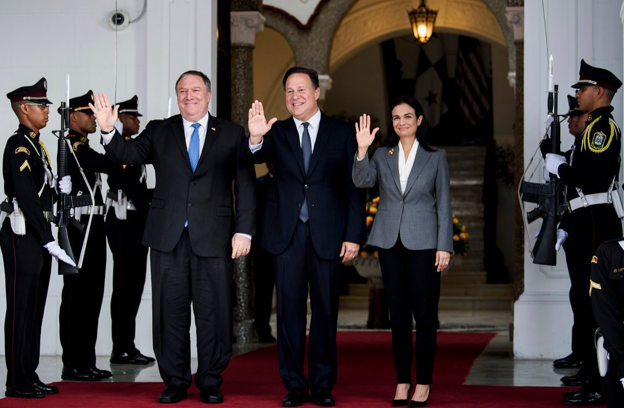Secretary of State Mike Pompeo said Thursday that he had warned President Juan Carlos Varela of Panama about doing business with China, criticizing Chinese state-owned enterprises that engage in “predatory economic activity.”
As his plane left Panama City, Mr. Pompeo recounted his talks with Mr. Varela and local journalists. Clearly concerned that Panama could become a beachhead for growing Chinese economic influence in the Western Hemisphere, he emphasized that Panamanians should be cautious when considering business ties with China.
Mr. Pompeo said he intended to tell the entire region that “when China comes calling, it’s not always to the good of your citizens,” and that countries had to watch out for Chinese companies that “show up with deals that seem too good to be true.”
His warning came more than a year after Panama cut diplomatic relations with Taiwan — which China views as a part of its territory — in favor of establishing ties with Beijing. Two other nations in the region followed suit this year.
Mr. Pompeo visited Panama City for an afternoon, stopping at the presidential palace to meet with Mr. Varela before going to the United States Embassy to address employees there. Mr. Pompeo told reporters on his plane that he had discussed a range of issues with Panamanian leaders, from economic ties to counternarcotics, and that China was one of the priorities.
“The importance isn’t that China is out competing in the world,” he said. “We welcome that. It’s when state-owned enterprises show up in a way that is clearly not transparent, clearly not market-driven and designed not to benefit the people of Panama, but rather to benefit the Chinese government.”
“Those are the kind of things we think are both inappropriate and not good for the people of Panama or any other country where China is engaged in this kind of predatory economic activity.”
Mr. Pompeo declined to cite specific projects that he considered questionable.
Mr. Pompeo’s warning was one of the clearest expressions yet by a senior American official of growing anxiety in Washington over China’s global economic activities, especially involving loans and infrastructure projects.
Policymakers point to the 99-year lease and controlling equity that a Chinese state-owned enterprise got last December on a port in Hambantota, Sri Lanka, after the Sri Lankan government failed to pay back loans. American officials suspect the port will be used for military activities and will give the People’s Liberation Army a major foothold in the Indian Ocean — and they fear China could duplicate such projects elsewhere, including in the Western Hemisphere.
The Trump administration is formulating a broad strategy to compete with China’s economic and military presence across the globe. The administration’s current National Security Strategy envisions the onset of great-power rivalry with China and Russia. In a speech this month, Vice President Mike Pence sharply criticized Chinese influence both in the United States and abroad.
China is the second-biggest user of the Panama Canal, after the United States. Last November, five months after cutting diplomatic ties with Taiwan, Mr. Varela traveled to Beijing to meet President Xi Jinping, where they signed 19 deals, including a feasibility study on a free-trade agreement.
Chinese companies are working on a range of infrastructure projects in Panama, including ports. One company is studying the potential for building a new railway. Panama has said it supports China’s Belt and Road Initiative, the ambitious network of global infrastructure projects promoted by Mr. Xi.
Panama is a fulcrum in American dominance of the Western Hemisphere. The Panama Canal has been critical to the strategic and economic needs of the United States. And Panama is the land bridge to Colombia, where the United States has invested billions of dollars to try to stem drug exports.
Senior U.S. officials only became aware of the extent of China’s influence in Panama with Mr. Varela’s June 2017 announcement that it was cutting ties to Taiwan.
The United States ambassador at the time, John Feeley, said he had heard about the switch from Mr. Varela only an hour or so before the president announced it, and only because he had called Mr. Varela to talk about an unrelated matter.
At the time, the United States did not issue a strong statement. But then the Dominican Republic switched recognition this May, and El Salvador did so in August. Recognizing that China was asserting its influence behind the scenes in what the United States considered its backyard, the White House issued a strong statement criticizing El Salvador’s move.
